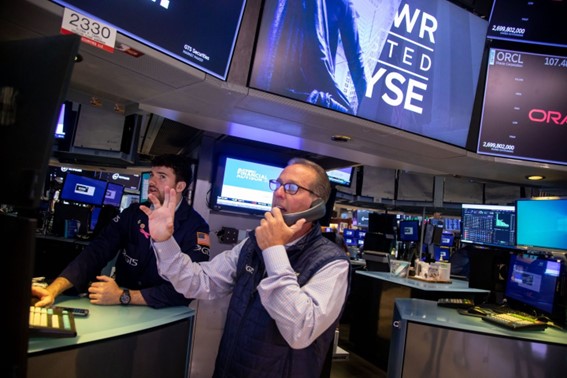
自从OpenAI去年11月推出新聊天机器人ChatGPT后,投资者就开始看好人工智能(AI)及其彻底改变世界经济的潜力。2023年,随着AI工具的普及,人们预期未来生产率将会提高,而成本将会降低,因此虽然通胀率居高不下、利息上扬且经济学家一致预测经济面临衰退,市场仍然受到了提振。在2022年下跌逾30%后,以科技股为主的纳斯达克综合指数(Nasdaq Composite)今年迄今上涨了超过28%,几乎收复了所有跌幅,而标准普尔500指数(S&P 500)目前也上涨了超过12%。
尽管有些华尔街人质疑股市能否在今年下半年保持涨势——他们指出,迄今为止引领股市回暖的大型科技公司和AI公司的估值都过高,但是韦德布什证券公司(Wedbush)顶级科技分析师丹·艾夫斯(Dan Ives)认为,现在全球还处在“AI淘金热”的初期。
周一,这位资深分析师在一份研究报告中写道,“由于科技公司估值大幅波动,许多对科技持怀疑态度的人会把今天比作‘1999年时刻’(即互联网泡沫濒临破灭的时期)。我们强烈反对这一说法。”“虽然科技股的估值是一个需要重点关注的问题,但我们仍然相信AI正在推动科技行业走向‘1995年时刻’,使该行业在未来很长一段时间内维持1990年代以来从未见过的强劲涨势。”
1995年的刚兴起的互联网热潮与2023年的AI革命有着极其惊人的相似之处。无论是当时还是现在,专家都认为,一项新技术即将重塑全球经济。那时候,股市刚刚结束惨淡的一年,而且由于美国国债上涨,经济学家和企业领导者都在为美国的前景感到担忧。像1993年1月出版的《破产1995》(Bankruptcy 1995)这类书成为了上世纪90年代初的畅销书,它们都警告称美国“赤字危机”导致的经济崩溃即将来临——当然,这一刻并未到来。
尽管市场充满担忧情绪和悲观预测,但在1995年至2001年互联网泡沫破灭期间,由于经济保持稳定且投资者希望从互联网的崛起中获利,纳斯达克综合指数仍然飙升了超过800%。在接下来的一年半里,随着估值回归正常水平,该指数几乎回吐了全部涨幅,但值得注意的是,1995年是互联网泡沫的初期,而不是末期。
艾夫斯认为,我们如今可能会看到相似的模式,并且表示,AI的发展标志着某种类似于互联网革命的东西的到来,他称之为“第四次工业革命”。艾夫斯预计,仅在今年下半年,“科技行业”股票就将再飙升10%至12%,因为投资者将会认识到AI对于科技公司来说是一个“价值8000亿美元的机会”,并且这些公司已经开始从中获利。
此外,艾夫斯还表示,通胀正在“迅速降温”,这应该会使美联储结束拖累经济的连续大幅加息操作。美国劳工统计局的数据显示,以居民消费价格指数计算,同比通胀率已从2022年6月的40年峰值9.1%下降到今年4月的仅4.9%。该机构将于周二公布5月的数据。
艾夫斯指出,如果通胀真的继续下跌,那么投资者应该会重燃对能从牛市中获利的高风险股的兴趣。他写道,“这表明,2023年科技股将表现强劲”,并称投资者对AI的日益关注势必会推动“风险承受交易”。
艾夫斯说,微软和英伟达依然是AI领域“无可争议的市场引领者”,但他也认为,谷歌、甲骨文、亚马逊、赛富时、Palantir、MongoDB、苹果公司、IBM、Meta、Snowflake和C3.ai等科技中坚力量,以及规模较小的科技公司,也将从技术的发展中获益。(财富中文网)
译者:中慧言-刘嘉欢
自从OpenAI去年11月推出新聊天机器人ChatGPT后,投资者就开始看好人工智能(AI)及其彻底改变世界经济的潜力。2023年,随着AI工具的普及,人们预期未来生产率将会提高,而成本将会降低,因此虽然通胀率居高不下、利息上扬且经济学家一致预测经济面临衰退,市场仍然受到了提振。在2022年下跌逾30%后,以科技股为主的纳斯达克综合指数(Nasdaq Composite)今年迄今上涨了超过28%,几乎收复了所有跌幅,而标准普尔500指数(S&P 500)目前也上涨了超过12%。
尽管有些华尔街人质疑股市能否在今年下半年保持涨势——他们指出,迄今为止引领股市回暖的大型科技公司和AI公司的估值都过高,但是韦德布什证券公司(Wedbush)顶级科技分析师丹·艾夫斯(Dan Ives)认为,现在全球还处在“AI淘金热”的初期。
周一,这位资深分析师在一份研究报告中写道,“由于科技公司估值大幅波动,许多对科技持怀疑态度的人会把今天比作‘1999年时刻’(即互联网泡沫濒临破灭的时期)。我们强烈反对这一说法。”“虽然科技股的估值是一个需要重点关注的问题,但我们仍然相信AI正在推动科技行业走向‘1995年时刻’,使该行业在未来很长一段时间内维持1990年代以来从未见过的强劲涨势。”
1995年的刚兴起的互联网热潮与2023年的AI革命有着极其惊人的相似之处。无论是当时还是现在,专家都认为,一项新技术即将重塑全球经济。那时候,股市刚刚结束惨淡的一年,而且由于美国国债上涨,经济学家和企业领导者都在为美国的前景感到担忧。像1993年1月出版的《破产1995》(Bankruptcy 1995)这类书成为了上世纪90年代初的畅销书,它们都警告称美国“赤字危机”导致的经济崩溃即将来临——当然,这一刻并未到来。
尽管市场充满担忧情绪和悲观预测,但在1995年至2001年互联网泡沫破灭期间,由于经济保持稳定且投资者希望从互联网的崛起中获利,纳斯达克综合指数仍然飙升了超过800%。在接下来的一年半里,随着估值回归正常水平,该指数几乎回吐了全部涨幅,但值得注意的是,1995年是互联网泡沫的初期,而不是末期。
艾夫斯认为,我们如今可能会看到相似的模式,并且表示,AI的发展标志着某种类似于互联网革命的东西的到来,他称之为“第四次工业革命”。艾夫斯预计,仅在今年下半年,“科技行业”股票就将再飙升10%至12%,因为投资者将会认识到AI对于科技公司来说是一个“价值8000亿美元的机会”,并且这些公司已经开始从中获利。
此外,艾夫斯还表示,通胀正在“迅速降温”,这应该会使美联储结束拖累经济的连续大幅加息操作。美国劳工统计局的数据显示,以居民消费价格指数计算,同比通胀率已从2022年6月的40年峰值9.1%下降到今年4月的仅4.9%。该机构将于周二公布5月的数据。
艾夫斯指出,如果通胀真的继续下跌,那么投资者应该会重燃对能从牛市中获利的高风险股的兴趣。他写道,“这表明,2023年科技股将表现强劲”,并称投资者对AI的日益关注势必会推动“风险承受交易”。
艾夫斯说,微软和英伟达依然是AI领域“无可争议的市场引领者”,但他也认为,谷歌、甲骨文、亚马逊、赛富时、Palantir、MongoDB、苹果公司、IBM、Meta、Snowflake和C3.ai等科技中坚力量,以及规模较小的科技公司,也将从技术的发展中获益。(财富中文网)
译者:中慧言-刘嘉欢
Ever since the release of OpenAI’s new chatbot ChatGPT in November, investors have been enamored with A.I. and its potential to revolutionize the world’s economy. Hopes for a future with increased productivity and lower costs as A.I. tools are rolled out to the masses have helped to lift markets in 2023 despite stubborn inflation, rising interest rates, and consistent recession predictions from economists. After dropping more than 30% in 2022, the tech-heavy Nasdaq Composite has recovered nearly all of its losses, gaining over 28% year to date, and the S&P 500 is now up more than 12%.
While some on Wall Street question whether stocks can continue their run of form in the second half of the year, pointing to stretched valuations in the Big Tech names and A.I. plays that have led the rebound so far, Wedbush’s top tech analyst Dan Ives argues it’s just the beginning of the “A.I. gold rush.”
“Many of the tech skeptics will point to today as a ‘1999 moment,’ à la on the verge of the dotcom bubble/collapse, given the significant move in tech valuations. We strongly disagree,” the veteran analyst wrote in a Monday research note. “While valuations in tech will be front and center, we continue to believe A.I. is driving the tech sector to a ‘1995 moment’ with a long runway of growth ahead that we have not seen since the 1990s.”
The parallels between the dotcom era that began in 1995 and the A.I. revolution of 2023 are quite striking. Both then and now, experts argued that a new technology was on the verge of rewiring the global economy. Stocks were coming off a down year, and economists and business leaders were worried about the future of the U.S. because of its rising national debt. Books like the January 1993 title Bankruptcy 1995 became bestsellers in the early ’90s, warning of a coming economic crash due to America’s “deficit crisis”—which, of course, never came.
Despite the fears and pessimistic predictions, between 1995 and the collapse of the dotcom bubble in 2001, the Nasdaq Composite rose over 800% as the economy remained stable and investors looked to profit from the rise of the internet. Over the following year and half, the index gave back nearly all of those gains when valuations came back to earth, but 1995 was the start of the bubble, not the end.
Ives believes that we could be seeing a similar pattern now, arguing the development of A.I. represents something akin to the internet, calling it the “4th Industrial Revolution.” He predicts the “tech sector” stocks will soar another 10% to 12% in the second half of the year alone as investors recognize that A.I. is an “$800 billion opportunity” for tech firms, and monetization has already begun.
On top of that, he argued that inflation is “rapidly cooling,” which should enable the Federal Reserve to end its streak of aggressive interest rate hikes that have weighed on the economy. As measured by the consumer price index, year-over-year inflation dropped from its June 2022 four-decade high of 9.1% to just 4.9% in April, according to the U.S. Bureau of Labor Statistics. The agency will release May’s data on Tuesday.
If inflation does continue to fall, it should lead investors back into riskier stocks that can benefit from a bull market, according to Ives. “This speaks to a strong year for tech stocks in 2023,” he wrote, arguing the “risk-on trade” will gain momentum as investors focus on the A.I.
Ives said that Microsoft and Nvidia remain the “clear market leaders” in A.I., but he also believes Google, Oracle, Amazon, Salesforce, Palantir, MongoDB, Apple, IBM, Meta, Snowflake, C3.ai, and other tech stalwarts, along with smaller players in the industry, will benefit as the technology advances.






